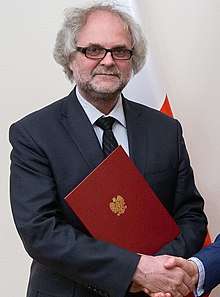Michał Murkociński
Michał Murkociński (born 1964, in Kraków) is a Polish diplomat and arabist, serving as an ambassador to Syria (2008–2012), Egypt (2014–2018) and Sudan (since 2019).
Michał Murkociński | |
|---|---|
 | |
| Poland Ambassador to Syria | |
| In office 2008–2012 | |
| Preceded by | Jacek Chodorowicz |
| Succeeded by | Krzysztof Czapla |
| Poland Ambassador to Egypt | |
| In office 2014–2018 | |
| Preceded by | Piotr Puchta |
| Succeeded by | Michał Łabenda |
| Poland Ambassador to Sudan | |
| Assumed office 2019 | |
| Personal details | |
| Born | 1964 (age 55–56) Kraków, Poland |
| Nationality | Polish |
| Children | 2 sons |
| Alma mater | Jagiellonian University |
| Profession | Diplomat, arabist |
Education and career
Murkociński holds an M.A. in Arab studies from the Jagiellonian University (1990). He has been studying in Damascus, Cairo and Stanford University, as well.[1] In the early 1990s, he was working as an Arabic language teacher.[2]
In 1993, Murkociński joined the Ministry of Foreign Affairs. Following his secondment to the embassy in Cairo, he has been First Secretary at the embassy in Damascus (1996–2001). Between 2004 and 2006, he was working at the embassy in Beirut, taking also responsibility of chargé d'affaires. Afterwards, from 2006 to 2008, he was the director of the Department of Africa and the Middle East. In 2008,[3] he started his term as an ambassador to Syria.[4] Four years later, due to the outbreak of the Syrian Civil War, he closed the embassy and returned to Warsaw. For the next two years he was working as a deputy director of the aforementioned department. Between 2014[5] and 2018, he was the ambassador to Egypt, with accreditation to Sudan and Eritrea as well. In 2018, back in Warsaw, he was head of the Persian Gulf Unit at the Ministry.[6] On 29 March 2019, he was appointed roving ambassador to Sudan.[7]
Murkociński is married, with two sons. Beside Polish and Arabic, he speaks English, Russian, and French languages.[2]
He authored several articles on Damascus Arabic.
Works
- Murkocińska, Joanna; Murkociński, Michał (2015), Polsko-arabski słownik frazeologiczny dialektu syryjskiego, Kraków: Księgarnia Akademicka, p. 424, ISBN 978-83-7638-563-1
References
- "Protokół posiedzenia Komisji Spraw Zagranicznych /nr 43/, Biuletyn nr: 787/VI". orka.sejm.gov.pl (in Polish). 12 June 2008. Retrieved 2019-07-25.
- "Zapis przebiegu posiedzenia Komisji Spraw Zagranicznych /nr 106/". www.sejm.gov.pl (in Polish). 7 November 2013. Retrieved 2019-07-25.
- "Złożenie listów uwierzytelniających". www.msz.gov.pl (in Polish). 10 November 2008. Retrieved 2019-07-25.
- "Ambasador". kair.msz.gov.pl (in Polish). 2018-04-26. Archived from the original on 2018-04-26. Retrieved 2019-07-25.
- "وزير الآثار يبحث مع السفير النمساوى امكانية ترميم متحف الفن الاسلامى | النيل - قناة مصر الإخبارية". nile.eg (in Arabic). 4 May 2014. Retrieved 2019-07-25.
- "Relacja: Seminarium biznesowe Polska-Sudan - Krajowa Izba Gospodarcza". kig.pl (in Polish). 11 December 2018. Retrieved 2019-07-25.
- "Michał Murkociński nowym ambasadorem RP w Sudanie". Ministerstwo Spraw Zagranicznych (in Polish). 29 March 2019. Retrieved 2019-07-25.